Related Research Articles
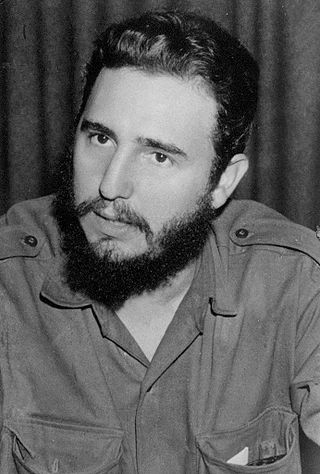
Fidel Alejandro Castro Ruz was a Cuban revolutionary and politician who was the leader of Cuba from 1959 to 2008, serving as the prime minister of Cuba from 1959 to 1976 and president from 1976 to 2008. Ideologically a Marxist–Leninist and Cuban nationalist, he also served as the first secretary of the Communist Party of Cuba from 1965 until 2011. Under his administration, Cuba became a one-party communist state; industry and business were nationalized, and socialist reforms were implemented throughout society.

Pope Shenouda III was the 117th Pope of Alexandria and Patriarch of the See of St. Mark. His papacy lasted 40 years, 4 months, and 4 days, from 14 November 1971 until his death.

Raúl Modesto Castro Ruz is a Cuban retired politician and general who served as the first secretary of the Communist Party of Cuba, the most senior position in the one-party communist state, from 2011 to 2021, and President of Cuba between 2008 and 2018, succeeding his brother Fidel Castro.

The Cuban Revolution was the military and political effort to overthrow Fulgencio Batista's dictatorship which reigned as the government of Cuba between 1952 and 1959. It began after the 1952 Cuban coup d'état which saw former president and military general, Fulgencio Batista topple the nascent Cuban democracy and consolidate power. Among those opposing the coup was Fidel Castro, then a novice attorney who attempted to contest the coup through Cuba's judiciary. Once these efforts proved fruitless, Fidel Castro and his brother Raúl lead an armed attack on the Cuban military's Moncada Barracks on July 26, 1953. Following the attack's failure, Fidel Castro and his co-conspirators were arrested and formed the 26th of July Movement (M-26-7) in detention. At his trial, Fidel Castro launched into a two hour speech that won him national fame as he laid out his grievances against the Batista dictatorship. In an attempt to win public approval, Batista granted amnesty to the surviving Moncada Barracks attackers and the Castros fled into exile. During their exile, the Castros consolidated their strategy in Mexico and subsequently reentered Cuba in 1956, accompanied by Che Guevara, whom they had encountered during their time in Mexico.

Oswaldo Payá Sardiñas was a Cuban political activist. A Roman Catholic, he founded the Christian Liberation Movement in 1987 to oppose the one-party rule of the Cuban Communist Party. He attracted international attention for organizing a petition drive known as the Varela Project, in which 25,000 signatories petitioned the Cuban government to guarantee freedom of speech and freedom of assembly as well as to institute a multi-party democracy. In recognition of his work, he received the European Parliament's Sakharov Prize and People in Need's Homo Homini Award.
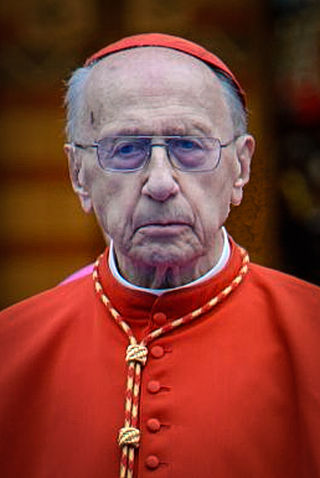
Roger Marie Élie Etchegaray was a French cardinal of the Catholic Church. Etchegaray served as the Archbishop of Marseille from 1970 to 1985 before entering the Roman Curia, where he served as President of the Pontifical Council for Justice and Peace (1984–1998) and President of the Pontifical Council Cor Unum (1984–1995). He was elevated to the rank of cardinal in 1979, and was the longest-serving cardinal never to attend a papal conclave.

The Catholic Church in Cuba is part of the worldwide Catholic Church, under the spiritual leadership of the Pope in Rome. Catholics make up approximately half of the population of Cuba.
Christianity is the most widely professed religion in Cuba, with Catholicism being its largest denomination. A significant share of the Cuban population is either non-religious or practices folk religions.

Juan Almeida Bosque was a Cuban politician and one of the original commanders of the insurgent forces in the Cuban Revolution. After the rebels took power in 1959, he was a prominent figure in the Communist Party of Cuba. At the time of his death, he was a Vice-President of the Cuban Council of State and was its third ranking member. He received several decorations, and national and international awards, including the title of "Hero of the Republic of Cuba" and the Order of Máximo Gómez.
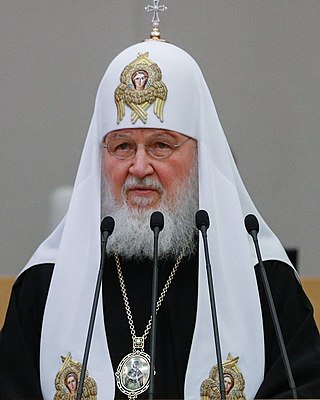
Kirill or Cyril is a Russian Orthodox bishop. He became Patriarch of Moscow and all Rus' and Primate of the Russian Orthodox Church on 1 February 2009.
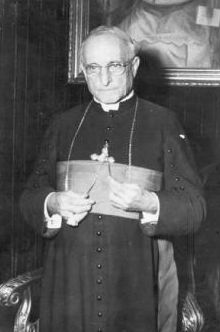
Manuel Arteaga y Betancourt was a Cuban prelate of the Catholic Church who served as Archbishop of Havana from 1941 to 1963. He raised to the rank of cardinal in 1946.
Christopher Columbus, on his first Spanish-sponsored voyage to the Americas in 1492, sailed south from what is now the Bahamas to explore the northeast coast of Cuba and the northern coast of Hispaniola. Columbus, who was searching for a route to India, believed Cuba to be a peninsula of the Asian mainland. The first sighting of a Spanish ship approaching Cuba was on 28 October 1492, probably at Bariay, Holguín Province, on the eastern point of Cuba.
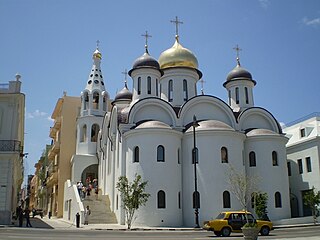
The Our Lady of Kazan Orthodox Cathedral, is a Russian Orthodox cathedral located in historic old town of Havana, Cuba, under the jurisdiction of the Russian Orthodox Church.

Fidel Castro proclaimed himself to be "a socialist, and Marxist–Leninist". As a Marxist–Leninist, Castro believed strongly in converting Cuba, and the wider world, from a capitalist system in which individuals own the means of production into a socialist system in which the means of production are owned by the workers. In the former, there is a class divide between the wealthy classes who control the means of production and the poorer working classes who labor on them, whilst in the latter, there is a decreasing class divide as the government redistributes the means of production leading to communism. Castro used Leninist thought as a model upon which to convert the Cuban state and society into a socialist form.
The early life of Cuban dictator and politician Fidel Castro spans the first 26 years of his life, from 1926 to 1952. Born in Birán, Oriente Province, Castro was the illegitimate son of Ángel Castro y Argiz, a wealthy farmer and landowner, and his mistress Lina Ruz González. First educated by a tutor in Santiago de Cuba, Fidel Castro then attended two boarding schools before being sent to El Colegio de Belén, a school run by Jesuits in Havana. In 1945 he began studying law at the University of Havana, where he first became politically conscious, becoming a staunch anti-imperialist and critic of United States involvement in the Caribbean. Involved in student politics, he was affiliated to Eduardo Chibás and his Partido Ortodoxo, achieving publicity as a vocal critic of the pro-U.S. administration of President Ramón Grau and his Partido Auténtico.
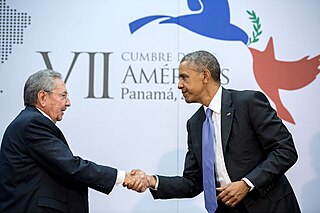
The Cuban thaw was the normalization of Cuba–United States relations that began in December 2014 ending a 54-year stretch of hostility between the nations. In March 2016, Barack Obama became the first U.S. president to visit Cuba since Calvin Coolidge in 1928. The normalization of relations between the United States and Cuba was relatively short lived, with much of the diplomatic progress that was made later being undone by the Trump administration.

Cuba–Holy See relations are foreign relations between the Holy See and the Republic of Cuba.

The Joint Declaration of Pope Francis and Patriarch Kirill, also known as the Havana Declaration, was issued following the first meeting in February 2016 between Pope Francis, who, as the Bishop of Rome, is the pontiff of the Catholic Church, and Patriarch Kirill of Moscow, Patriarch of Moscow and all Rus', Patriarch of the Russian Orthodox Church (ROC), the largest of the Eastern Orthodox churches. This was the first time leaders of the Catholic Church and the Moscow Patriarchate had met. While the meeting was also seen as a symbolic moment in the history of relations between the Catholic Church and the Orthodox churches as a community, which had split in the Great Schism of 1054, centuries before the Moscow Patriarchate was constituted, it was not expected to lead to any immediate rapprochement between them.

Former First Secretary of the Communist Party of Cuba and President of the Council of State, Fidel Castro died of natural causes at 22:29 (CST) on the evening of 25 November 2016, at the age of 90. His brother, the then-President of the State Council and then-First Secretary Raúl Castro, made an announcement about his death on state television. One of the most controversial political leaders of his era, Castro both inspired and dismayed people across the world during his lifetime. The London Observer stated that he proved to be "as divisive in death as he was in life", and that the only thing that his "enemies and admirers" agreed upon was that he was "a towering figure" in world affairs who "transformed a small Caribbean island into a major force in world affairs". The Daily Telegraph noted that across the world he was "either praised as a brave champion of the people, or derided as a power-mad dictator." Castro's body was cremated and his ashes were interred in Santiago de Cuba on 4 December 2016, and hundreds of thousands of Cubans commemorated the event.
References
- 1 2 "Letters From Prison: Castro Revealed". The Washington Post. February 25, 2007.
- ↑ Comandante – Fidel Castro & Oliver Stone on YouTube.
- ↑ Antequera, Luis. "Del día en que Juan XXIII ¿excomulgó? a Fidel Castro, hace hoy 52 años". Religiön en Libertad. Retrieved 12 September 2022.
- ↑ Castro and Ramonet 2009. pp. 40–41.
- ↑ Hopkins, Dwight N.; Antonio, Edward P. (26 July 2012). The Cambridge Companion to Black Theology. Cambridge University Press. ISBN 9780521705691.
- ↑ "Pope John Paul II's visit to Cuba". The New York Times.
- ↑ Rother, Larry (January 28, 1998). "Pope Condemns Embargo; Castro Attends Mass". The New York Times.
- ↑ "Castro ratifies Christmas holiday". BBC News. 5 December 1998. Retrieved May 20, 2006.
- ↑ "Pope's Christmas message for Castro". BBC News. 28 December 1998. Retrieved May 20, 2006.
- ↑ "Castro attends convent blessing". BBC News. 9 March 2003. Retrieved May 20, 2006.
- ↑ A new Greek Orthodox Cathedral consecrated in Havana, Cuba. www.wcc-coe.org March 2004.
- ↑ Gibbs, Stephen (22 January 2004). "Castro greets Orthodox patriarch". BBC News. Retrieved May 20, 2006.
- ↑ Newman, Lucia (April 6, 2005). "Castro signs pope's condolence book". CNN.
- ↑ Batista, Carlos (April 5, 2005). "Fidel Castro mourns pope at Havana cathedral". Caribbean Net News. Archived from the original on November 28, 2016. Retrieved May 11, 2006.
- ↑ Castro and Ramonet 2009. p. 156.
- ↑ "Pope meets Cuba's Fidel Castro, slams U.S. embargo | Reuters". Reuters . 29 March 2012.
- ↑ "Pope Benedict XVI meets Fidel Castro". BBC News.
- ↑ The Daily Telegraph.
- ↑ "Pope Francis meets Fidel Castro". 20 September 2015.